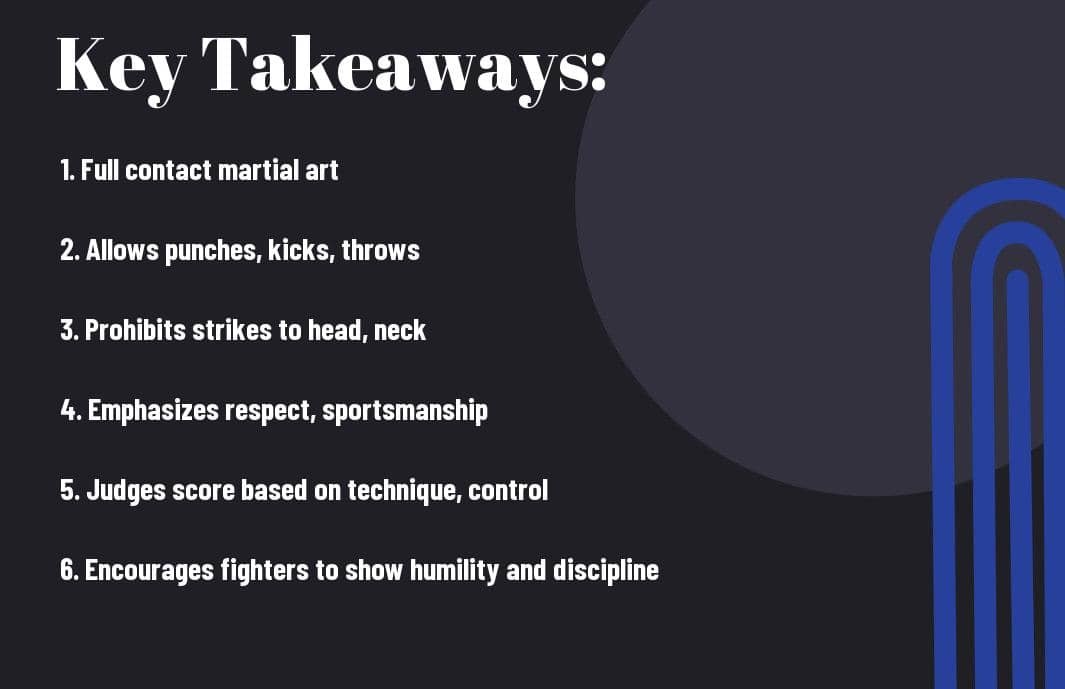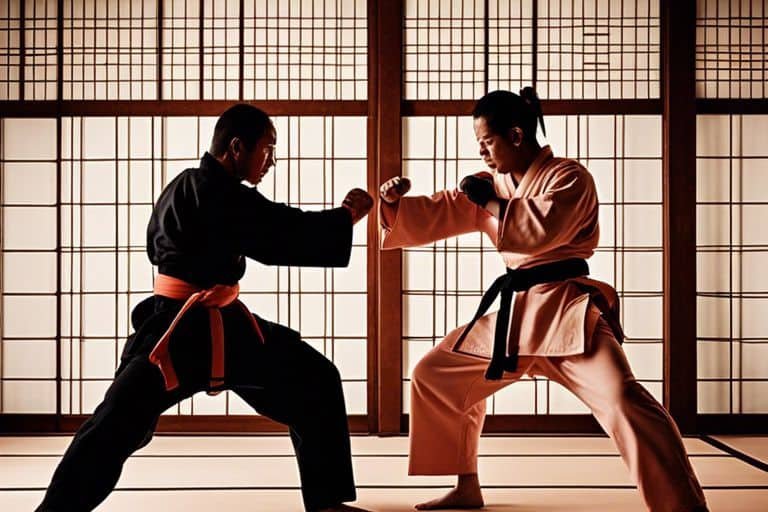Welcome to our informative blog post where you will learn all about the competitive rules of Kudo. Whether you are a seasoned practitioner or a beginner, understanding the regulations and guidelines of this martial art sport is crucial. Kudo, also known as Daido Juku, combines elements of kickboxing and judo, making it a high-intensity combat sport. In this post, you will discover the important and potentially dangerous details of the competitive rules, as well as the positive aspects that make Kudo an exhilarating and challenging sport.
Key Takeaways:
- Unified rules: Kudo has a unified set of rules that govern the competitions, ensuring a level playing field for all participants.
- Regulated contact: The competitive rules of Kudo regulate the amount and type of contact allowed during matches to ensure the safety of the athletes.
- Scoring system: Kudo utilizes a scoring system that rewards clean and effective techniques, promoting skill and precision in competition.
- Equipment regulations: Competitors must adhere to strict regulations regarding their gear and equipment, ensuring a fair and safe environment for all involved.
- Fair play ethos: Kudo places a significant emphasis on fair play and sportsmanship, with penalties enforced for unsportsmanlike conduct.

Fundamental Principles of Kudo Competition
When it comes to competing in Kudo, there are fundamental principles that every participant should be aware of. These principles are designed to ensure that Kudo competitions are conducted in a fair and respectful manner, while also prioritising the safety of all participants.
Safety and Fairness
One of the most important aspects of Kudo competition is ensuring the safety of all participants. This is achieved through the implementation of strict rules and regulations that govern the conduct of the competitors. These rules are in place to protect you from unnecessary harm and to ensure a level playing field for all competitors. For example, strikes to the head and neck are strictly prohibited in Kudo competitions, in order to prevent serious injury.
Respect and Sportsmanship
In addition to prioritising safety, Kudo competitions also place a strong emphasis on respect and sportsmanship. It is important to remember that your fellow competitors are not your enemies, but rather your colleagues in pursuit of the same goal. Respecting the rules and regulations, as well as your fellow competitors, is a fundamental aspect of participating in Kudo competitions. This means conducting yourself in a respectful manner at all times, both on and off the mat.
Official Kudo Competition Rules
When participating in Kudo competitions, it is crucial to familiarise yourself with the official rules to ensure fair play and to uphold the integrity of the sport. The rules governing Kudo competitions are designed to promote safety, sportsmanship, and provide a structured framework for participants to showcase their skills.
Weight Classes and Matchmaking
In Kudo competitions, fighters are divided into weight classes to ensure that matches are fair and evenly matched. Matchmaking is carefully considered to pair contestants of similar weight and skill level. This not only enhances the competitive nature of the matches but also reduces the risk of injury due to significant disparities in size and strength. It is important to adhere to these weight classes to compete fairly and safely in Kudo tournaments.
Scoring System and Winning Criteria
The scoring system in Kudo competitions is based on effective striking techniques, submissions, takedowns, and control of the ring. Points are awarded for clean and precise techniques, with greater emphasis placed on powerful and impactful strikes and successful grappling manoeuvres. The winning criteria are clear-cut, with emphasis placed on the effective application of techniques rather than pure aggression. Understanding the scoring system and winning criteria is essential in achieving success in Kudo competitions.
Protective Gear and Equipment Regulations
When participating in Kudo, it is essential to adhere to strict regulations regarding protective gear and equipment. These rules are in place to ensure the safety of all participants and to maintain the integrity of the sport.
Mandatory Protective Gear for Fighters
As a fighter in Kudo, it is mandatory for you to wear specific protective gear during matches. This includes a helmet with a face guard, mouth guard, gloves, groin guard, and shin guards. These pieces of equipment are crucial in protecting you from potential head injuries, facial trauma, dental damage, and lower body injuries. Failure to comply with these regulations may result in disqualification from the match.
Kudo Equipment Standards and Maintenance
In addition to the mandatory protective gear, there are specific standards and maintenance requirements for Kudo equipment. It is your responsibility to ensure that your gear meets these standards and is properly maintained. This includes regular inspection of your helmet, gloves, and other protective gear to check for any signs of damage or wear. The integrity of your equipment is paramount in ensuring your safety during training and competition.
Prohibited Actions and Penalties
When competing in Kudo, it is essential to adhere to the competitive rules to maintain a fair and safe environment for all participants. Understanding the prohibited actions and penalties is crucial for your success in this sport. Violating these rules can lead to serious consequences, including point deductions, disqualification, or even suspension from future competitions.
Illegal Techniques and Fouls
There are certain techniques that are strictly prohibited in Kudo, such as striking the throat, eyes, groin, or any joint manipulation beyond the normal range of motion. Using these illegal techniques not only puts your opponent at risk of serious injury, but it also violates the core principles of sportsmanship and fair play. Additionally, fouls including deliberately falling to avoid a clean throw or utilizing excessive force can result in penalties that may cost you the match.
Consequences for Rule Violations
It is of utmost importance to understand the consequences for violating the rules of Kudo. Depending on the severity of the offence, penalties can range from warnings to outright disqualification from the match. Repeated infractions or egregious violations may lead to suspension from future competitions, tarnishing your reputation as a respectful and skilled martial artist. It is crucial to uphold the values of Kudo and maintain the integrity of the sport through adherence to the established rules and regulations.
Refereeing and Judging in Kudo
In Kudo, the rules and regulations governing competitions are crucial in ensuring fair play and safety for all participants. Refereeing and judging play a central role in upholding these standards, and it is essential to understand their responsibilities and decision-making processes. You can find detailed information about the competitive rules of Kudo on the Competition Rules | Detroit KUDO – WordPress.com website.
Roles and Responsibilities of Officials
The officials in a Kudo competition, including referees and judges, bear the weighty responsibility of ensuring that matches are conducted fairly and in accordance with the rules. It is their duty to enforce the rules of the competition, observe the conduct of the competitors, and make impartial decisions based on their expertise. The safety of the participants, as well as the integrity of the sport, is in their hands, and they must perform their roles with the utmost diligence and impartiality.
Decision Making Process and Handling Disputes
The decision-making process in Kudo is a highly structured and meticulous affair. Referees and judges must assess each technique and exchange, taking into account factors such as technique execution, timing, and effectiveness. In the event of a dispute or disagreement, the officials must exercise their authority to resolve the matter decisively and fairly. This process is vital in maintaining the credibility and integrity of Kudo competitions, and the officials must be thorough and resolute in their approach.
By understanding the roles and responsibilities of officials, as well as the decision-making process and dispute resolution in Kudo, you gain insight into the meticulous and principled nature of the sport. Adherence to these principles ensures that Kudo competitions are conducted with the highest standards of fairness and safety, safeguarding the well-being and reputation of the participants.
Training and Preparation for Kudo Competitions
When preparing for Kudo competitions, it is crucial to understand the rules and regulations that govern the sport. Familiarising yourself with the Kudo rules is essential in order to compete effectively. You can find comprehensive information on Kudo rules at Kūdō Rules: How to Play, Basic Rules – Sportsmatik.
Physical and Mental Training Guidelines
Physical and mental training are both vital components of preparing for Kudo competitions. You should focus on developing your strength, speed, and endurance to meet the physical demands of the sport. Additionally, mental training to improve your focus, concentration, and resilience is equally important. The ability to maintain a strong mental state during competition can significantly impact your performance. Therefore, a balanced approach to physical and mental preparation is crucial for success in Kudo competitions.
Strategy and Tactics for Competitive Matches
Developing effective strategies and tactics is essential for competitive success in Kudo. You should focus on honing your striking techniques, footwork, and defensive manoeuvres to gain an advantage over your opponents. Understanding your opponent’s weaknesses and capitalising on them while utilising your own strengths is key to gaining the upper hand in matches. You should also be adaptable and able to adjust your strategies on the fly based on your opponent’s movements. This ability to think and act quickly can make a significant difference in the outcome of a match.
Conclusion
Presently, you have a thorough understanding of the competitive rules of Kudo. These rules govern the conduct of the fighters, the scoring system, and the prohibited techniques. It is important to familiarise yourself with these rules before participating in a Kudo competition to ensure fair play and the safety of all participants. Remember, adherence to the competitive rules of Kudo is essential for the integrity and success of the sport.
FAQ
Q: What Are the Competitive Rules of Kudo?
A: The competitive rules of Kudo are governed by the Kudo International Federation (KIF) and are designed to ensure fair and safe competition among practitioners.
Q: Are there specific weight classes in Kudo competitions?
A: Yes, Kudo competitions are divided into weight classes to ensure fairness and safety for all competitors. The weight classes may vary depending on the specific event or tournament.
Q: What are the prohibited techniques in Kudo competitions?
A: Prohibited techniques in Kudo competitions include strikes to the groin, eyes, or throat, as well as small joint manipulation, hair pulling, and any techniques that cause unnecessary harm to an opponent.
Q: Can competitors wear protective gear in Kudo competitions?
A: Yes, competitors are allowed to wear protective gear such as gloves, mouthguards, and shin guards in Kudo competitions to ensure their safety during matches.
Q: How are Kudo competitions scored?
A: Kudo competitions are scored based on a combination of effective striking, grappling, throws, and control techniques. Judges award points for successful techniques and overall performance during the match.
Q: Are there any restrictions on attire in Kudo competitions?
A: Competitors are required to wear a traditional Kudo uniform (gi) during matches, and female competitors may also wear a sports bra underneath the gi for comfort and support.
Q: What are the rules regarding sportsmanship and conduct in Kudo competitions?
A: Competitors are expected to demonstrate respect, sportsmanship, and fair play throughout the competition. Unsportsmanlike conduct, such as taunting, verbal abuse, or deliberate fouls, is strictly prohibited and may result in disqualification.



